【英语】浙江省嘉兴市第一中学2015-2016学年高一下学期期中考试
浙江省嘉兴一中高一下学期期中考试(英语)
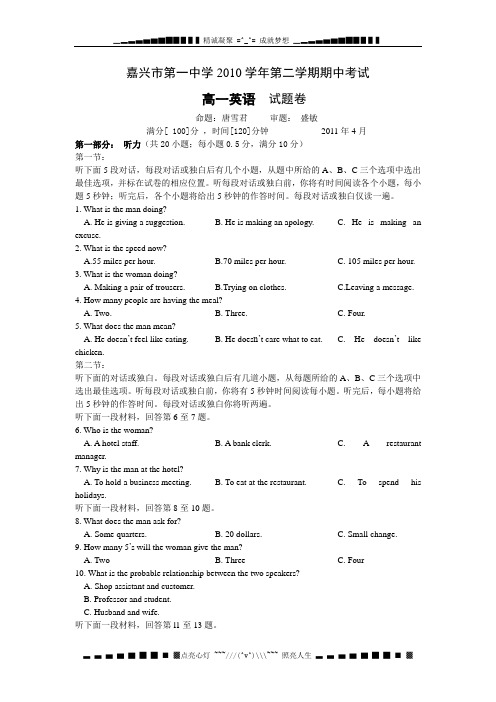
嘉兴市第一中学2010学年第二学期期中考试高一英语试题卷命题:唐雪君审题:盛敏满分[ 100]分,时间[120]分钟2011年4月第一部分:听力(共20小题;每小题0.5分,满分10分)第一节:听下面5段对话,每段对话或独白后有几个小题,从题中所给的A、B、C三个选项中选出最佳选项,并标在试卷的相应位置。
听每段对话或独白前,你将有时间阅读各个小题,每小题5秒钟;听完后,各个小题将给出5秒钟的作答时间。
每段对话或独白仅读一遍。
1. What is the man doing?A. He is giving a suggestion.B. He is making an apology.C. He is making an excuse.2. What is the speed now?A.55 miles per hour.B.70 miles per hour.C. 105 miles per hour.3. What is the woman doing?A. Making a pair of trousers.B.Trying on clothes.C.Leaving a message.4. How many people are having the meal?A. Two.B. Three.C. Four.5. What does the man mean?A. He doesn’t feel like eating.B. He does n’t care what to eat.C. He doesn’t like chicken.第二节:听下面的对话或独白。
每段对话或独白后有几道小题,从每题所给的A、B、C三个选项中选出最佳选项。
听每段对话或独白前,你将有5秒钟时间阅读每小题。
听完后,每小题将给出5秒钟的作答时间。
每段对话或独白你将听两遍。
听下面一段材料,回答第6至7题。
6. Who is the woman?A. A hotel staff.B. A bank clerk.C. A restaurant manager.7. Why is the man at the hotel?A. To hold a business meeting.B. To eat at the restaurant.C. To spend his holidays.听下面一段材料,回答第8至10题。
江省嘉兴一中高一期中考试英语答案
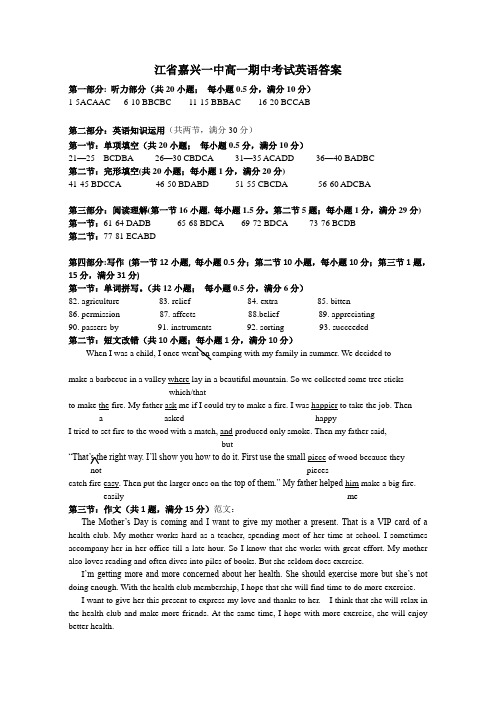
江省嘉兴一中高一期中考试英语答案第一部分: 听力部分(共20小题;每小题0.5分,满分10分)1-5ACAAC 6-10 BBCBC 11-15 BBBAC 16-20 BCCAB第二部分:英语知识运用(共两节,满分30分)第一节:单项填空(共20小题;每小题0.5分,满分10分)21—25 BCDBA 26—30 CBDCA 31—35 ACADD 36—40 BADBC第二节:完形填空(共20小题;每小题1分,满分20分)41-45 BDCCA 46-50 BDABD 51-55 CBCDA 56-60 ADCBA第三部分:阅读理解(第一节16小题, 每小题1.5分。
第二节5题;每小题1分,满分29分) 第一节:61-64 DADB 65-68 BDCA 69-72 BDCA 73-76 BCDB第二节:77-81 ECABD第四部分:写作(第一节12小题, 每小题0.5分;第二节10小题,每小题10分;第三节1题,15分,满分31分)第一节:单词拼写。
(共12小题;每小题0.5分,满分6分)82. agriculture 83. relief 84. extra 85. bitten86. permission 87. affects 88.belief 89. appreciating90. passers-by 91. instruments 92. sorting 93. succeeded第二节:短文改错(共10小题;每小题1分,满分10分)When I was a child, I once went on camping with my family in summer. We decided tomake a barbecue in a valley where lay in a beautiful mountain. So we collected some tree stickswhich/thatto make the fire. My father ask me if I could try to make a fire. I was happier to take the job. Thena asked happyI tried to set fire to the wood with a match, and produced only smoke. Then my father said,but“That’s the right way. I’ll show you how to do it. First use the small piece of wood because they not piecescatch fire easy. Then put the larger ones on the top of them.” My father helped him make a big fire.easily me第三节:作文(共1题,满分15分)范文:The Mother’s Day is coming and I want to give my mother a present. That is a VIP card of a health club. My mother works hard as a teacher, spending most of her time at school. I sometimes accompany her in her office till a late hour. So I know that she works with great effort. My mother also loves reading and often dives into piles of books. But she seldom does exercise.I’m getting more and more concerned about her health. She should exercise more but she’s not doing enough. With the health club membership, I hope that she will find time to do more exercise.I want to give her this present to express my love and thanks to her. I think that she will relax in the health club and make more friends. At the same time, I hope with more exercise, she will enjoy better health.。
浙江省嘉兴一中高一下学期期中考试英语试题含听力
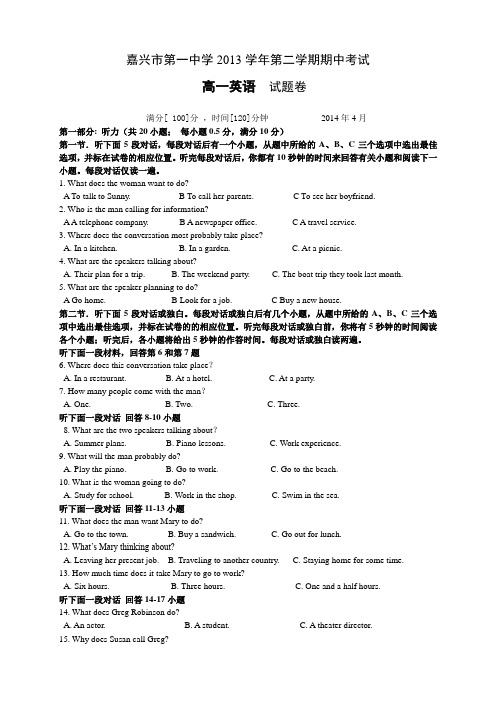
嘉兴市第一中学2013学年第二学期期中考试高一英语试题卷满分[ 100]分,时间[120]分钟2014年4月第一部分: 听力(共20小题;每小题0.5分,满分10分)第一节.听下面5段对话,每段对话后有一个小题,从题中所给的A、B、C三个选项中选出最佳选项,并标在试卷的相应位置。
听完每段对话后,你都有10秒钟的时间来回答有关小题和阅读下一小题。
每段对话仅读一遍。
1. What does the woman want to do?A To talk to Sunny.B To call her parents.C To see her boyfriend.2. Who is the man calling for information?A A telephone company.B A newspaper office.C A travel service.3. Where does the conversation most probably take place?A. In a kitchen.B. In a garden.C. At a picnic.4. What are the speakers talking about?A. Their plan for a trip.B. The weekend party.C. The boat trip they took last month.5. What are the speaker planning to do?A Go home.B Look for a job.C Buy a new house.第二节.听下面5段对话或独白。
每段对话或独白后有几个小题,从题中所给的A、B、C三个选项中选出最佳选项,并标在试卷的的相应位置。
听完每段对话或独白前,你将有5秒钟的时间阅读各个小题;听完后,各小题将给出5秒钟的作答时间。
每段对话或独白读两遍。
浙江省嘉兴市第一中学2015-2016学年高一下学期寒假学习检测英语试题
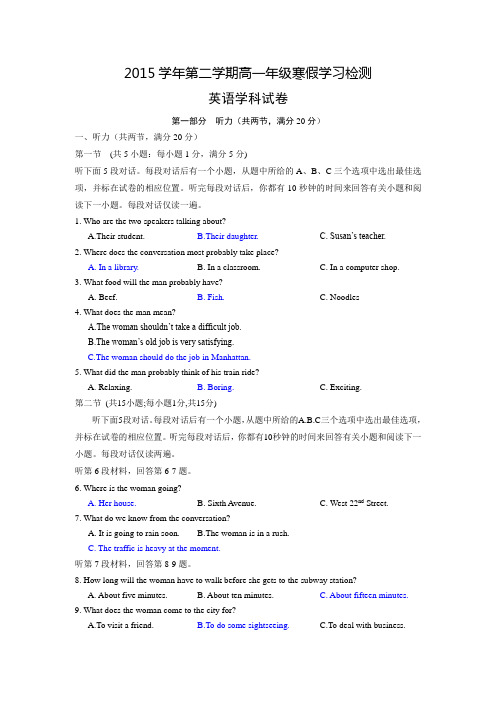
2015学年第二学期高一年级寒假学习检测英语学科试卷第一部分听力(共两节,满分20分)一、听力(共两节,满分20分)第一节(共5小题:每小题1分,满分5分)听下面5段对话。
每段对话后有一个小题,从题中所给的A、B、C三个选项中选出最佳选项,并标在试卷的相应位置。
听完每段对话后,你都有10秒钟的时间来回答有关小题和阅读下一小题。
每段对话仅读一遍。
1. Who are the two speakers talking about?A.Their student.B.Their daughter.C. Susan‟s teacher.2. Where does the conversation most probably take place?A. In a library.B. In a classroom.C. In a computer shop.3.What food will the man probably have?A. Beef.B. Fish.C. Noodles4. What does the man mean?A.The woman shouldn‟t take a difficult job.B.The woman‟s old job is very satisfying.C.The woman should do the job in Manhattan.5. What did the man probably think of his train ride?A. Relaxing.B. Boring.C. Exciting.第二节(共15小题;每小题1分,共15分)听下面5段对话。
每段对话后有一个小题,从题中所给的A.B.C三个选项中选出最佳选项,并标在试卷的相应位置。
听完每段对话后,你都有10秒钟的时间来回答有关小题和阅读下一小题。
每段对话仅读两遍。
听第6段材料,回答第6-7题。
高一英语下学期期中试题【会员独享】
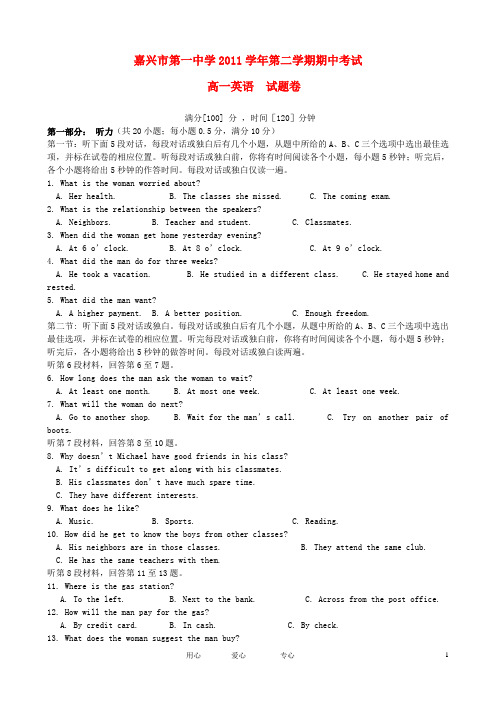
嘉兴市第一中学2011学年第二学期期中考试高一英语试题卷满分[100] 分,时间[120]分钟第一部分:听力(共20小题;每小题0.5分,满分10分)第一节:听下面5段对话,每段对话或独白后有几个小题,从题中所给的A、B、C三个选项中选出最佳选项,并标在试卷的相应位置。
听每段对话或独白前,你将有时间阅读各个小题,每小题5秒钟;听完后,各个小题将给出5秒钟的作答时间。
每段对话或独白仅读一遍。
1. What is the woman worried about?A. Her health.B. The classes she missed.C. The coming exam.2. What is the relationship between the speakers?A. Neighbors.B. Teacher and student.C. Classmates.3. When did the woman get home yesterday evening?A. At 6 o’clock.B. At 8 o’clock.C. At 9 o’clock.4. What did the man do for three weeks?A. He took a vacation.B. He studied in a different class.C. He stayed home and rested.5. What did the man want?A. A higher payment.B. A better position.C. Enough freedom.第二节: 听下面5段对话或独白。
每段对话或独白后有几个小题,从题中所给的A、B、C三个选项中选出最佳选项,并标在试卷的相应位置。
听完每段对话或独白前,你将有时间阅读各个小题,每小题5秒钟;听完后,各小题将给出5秒钟的做答时间。
每段对话或独白读两遍。
浙江省嘉兴市-高一英语下学期期中试题新人教版
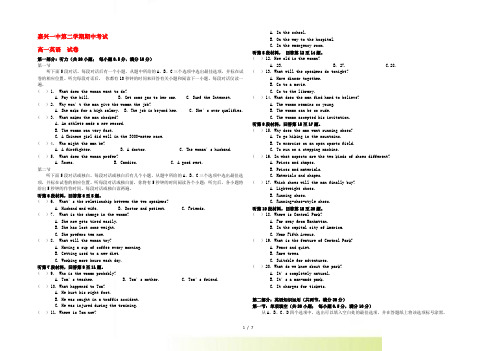
嘉兴一中第二学期期中考试高一英语试卷第一部分: 听力(共20小题;每小题0.5分,满分10分)第一节听下面5段对话。
每段对话后有一个小题,从题中所给的A、B、C三个选项中选出最佳选项,并标在试卷的相应位置。
听完每段对话后,你都有10秒钟的时间来回答有关小题和阅读下一小题。
每段对话仅读一遍。
( ) 1. What does the woman want to do?A. Pay the bill.B. Get some gas to her car.C. Surf the Internet.( ) 2. Why won’t the man give the woman the job?A. She asks for a high salary.B. The job is beyond her.C. She’s over qualifies. ( ) 3. What makes the man shocked?A. An athlete made a new record.B. The woman ran very fast.C. A Chinese girl did well in the 3000-meter race.( ) 4. Who might the man be?A. A firefighter.B. A doctor.C. The woman’s husband.( ) 5. What does the woman prefer?A. Roses.B. Candies.C. A good rest.第二节听下面5段对话或独白。
每段对话或独白后有几个小题,从题中所给的A、B、C三个选项中选出最佳选项,并标在试卷的相应位置。
听每段对话或独白前,你将有5秒钟的时间阅读各个小题;听完后,各小题将给出5秒钟的作答时间。
每段对话或独白读两遍。
听第6段材料,回答第6至8题。
( ) 6. What’s the relationship between the two speakers?A. Husband and wife.B. Doctor and patient.C. Friends.( ) 7. What is the change in the woman?A. She now gets tired easily.B. She has lost some weight.C. She prefers tea now.( ) 8. What will the woman try?A. Having a cup of coffee every morning.B. Getting used to a new diet.C. Working more hours each day.听第7段材料,回答第9至11题。
浙江省嘉兴市第一中学高一下学期寒假学习检测英语试题(含听力)
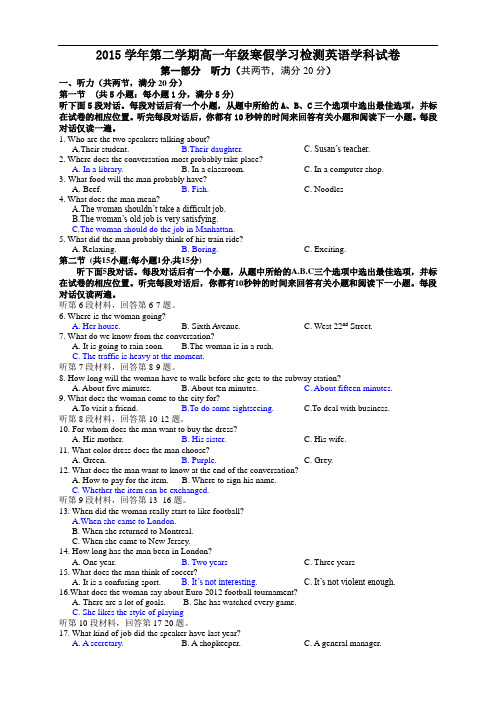
2015学年第二学期高一年级寒假学习检测英语学科试卷第一部分听力(共两节,满分20分)一、听力(共两节,满分20分)第一节 (共5小题:每小题1分,满分5分)听下面5段对话。
每段对话后有一个小题,从题中所给的A、B、C三个选项中选出最佳选项,并标在试卷的相应位置。
听完每段对话后,你都有10秒钟的时间来回答有关小题和阅读下一小题。
每段对话仅读一遍。
1. Who are the two speakers talking about?A.Their student.B.Their daughter.C. Susan’s teacher.2. Where does the conversation most probably take place?A. In a library.B. In a classroom.C. In a computer shop.3.What food will the man probably have?A. Beef.B. Fish.C. Noodles4. What does the man mean?A.The woman shouldn’t take a difficult job.B.The woman’s old job is very satisfying.C.The woman should do the job in Manhattan.5. What did the man probably think of his train ride?A. Relaxing.B. Boring.C. Exciting.第二节(共15小题;每小题1分,共15分)听下面5段对话。
每段对话后有一个小题,从题中所给的A.B.C三个选项中选出最佳选项,并标在试卷的相应位置。
听完每段对话后,你都有10秒钟的时间来回答有关小题和阅读下一小题。
每段对话仅读两遍。
听第6段材料,回答第6-7题。
高中英语真题:第一高级中学2015-2016学年高一下学期期中考试试卷 试题word版.doc
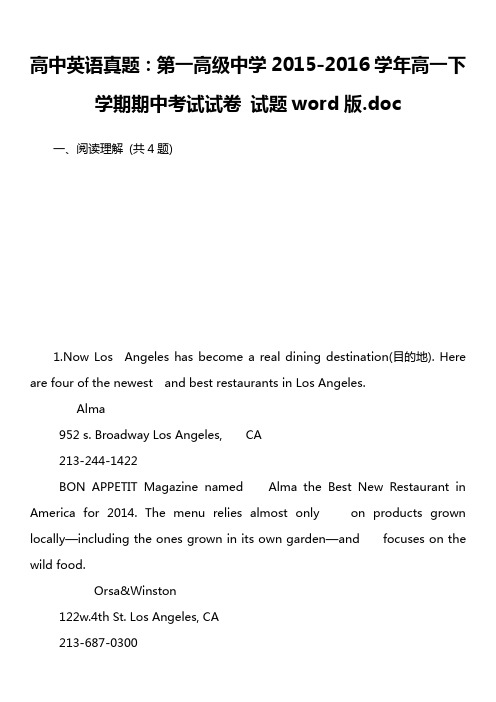
高中英语真题:第一高级中学2015-2016学年高一下学期期中考试试卷试题word版.doc一、阅读理解(共4题)1.Now Los Angeles has become a real dining destination(目的地). Here are four of the newest and best restaurants in Los Angeles.Alma952 s. Broadway Los Angeles, CA213-244-1422BON APPETIT Magazine named Alma the Best New Restaurant in America for 2014. The menu relies almost only on products grown locally—including the ones grown in its own garden—and focuses on the wild food.Orsa&Winston122w.4th St. Los Angeles, CA213-687-0300The Asian menu here changes daily. Sit back as the chefs(厨师) work near you in the open kitchen and get ready for a true taste adventure. “It tastes like in Italy, Japan and China,” reports Los Angeles Times reporter Jonathan Gold.Bestia2121E.7th Place Los Angeles, CA213-514-5724This new Italian-style restaurant, owned by a husband and wife chef team, not only makes its own pasta but also has 60 different kinds of meat and makes desserts. There are classics like pizza, meatballs and other delicious foods. You will have to make your reservation(预约) about a mouth in advance.Rivera1050 s. Flower St. Los Angeles , CA213-749-1460Longtime L.A. chef John Sedler believes that Latin food is at the heart of L.A.’s food culture. Rivera, which food critic Jonathan Gold has called the most successful Mexican restaurant in the city, doesn’t disappoint you with its inventive small menu and rolling food carts(手推车) full of small plates to share.21. If you like Chinese food, you’d better go to the restaurant inA.122w.4th St. Los Angeles, CAB.952 s. Broadway Los Angeles, CAC.2121E.7th Place Los Angeles, CAD.1050 s. Flower St. Los Angeles,CA22. What foods does the restaurant Bestia mainly serve?A. The wild food.B. Italian-style foods.C. Meatballs and fish.D. Different kinds of pasta.23. If you want to learn about Latin food, you can callA.213-244-1422B.213-514-5724C.213-749-1460D.213-687-03002.Are you looking for some new and exciting places to take your kids (孩子) to? Try some of these places.Visit art museums. They offer a variety of activities to excite your kids' interest. Many offer workshops for making land-made pieces, traveling exhibits, book signings by children's favorite writer, and even musical performances and other arts.Head to a natural history museum. This is where kids can discover the past from dinosaur(恐龙) models to rock collections and pictures of stars in the sky. Also, ask what kind of workshops and educational programs are prepared for kids and any special events that are coming up.Go to a Youtheater. Look for one in your area offering plays for child and family visitors. Pre-show play shops are conducted by area artists and educators where kids can discover the secret about performing arts. Puppet(木偶)making and stage make-up are just a couple of the special offerings you might find.Try hands-on science. Visit one of the many hands-on science museums around the country. These science play-lands are great fun for kids and grown-ups alike. They'll keep your child mentally and physically active the whole day through while pushing buttons, experimenting, and building. When everyone is tired, enjoy a fun family science show, commonly found in these museums.24. If a child is interested in the universe, he probably will visitA. a YoutheaterB. an art museumC. a natural history museumD. a hands-on sciencemuseum25. What can kids do at a Youtheater?A. Look at rock collections.B. See dinosaur models.C. Watch puppet making.D. Give performances.26. What does "hands-on science" mean in the last paragraph?A. Science games designed by kids.B. Learning science by doing things.C. A show of kids' science work.D. Reading science books.27. Where does this text probably come from?A. A science textbook.B. A tourist map.C. A museum guide.D. A news report.3.Before fridges, homes usually had ice boxes. But another way to keep food cool without electricity is to use an evaporative (蒸气) cooler. It is easy to make and does not even use ice.A common design is a tall box with several shelves inside. The shelves are pieces of metal with many small holes through them. The sides of the box are covered with pieces of thick cloth. Containers of water are placed at the top and bottom of the cooler. The ends of each piece of cloth lie in the water so the cloth stays wet.Put the cooler in the open air but not in the sun. Air will pass through while the inside of the box will stay several degrees cooler than the outside. This can keep foods fresh for a short time.The best way to prepare foods for storage (储存) is at harvest time. Place the harvested items on a clean surface, but not on the ground. Fruits and vegetables must be cool from field heat before they are stored. A good idea is to harvest foods either early or late in the day, then leave them to cool naturally. Do not remove outer leaves from fruits and vegetables before storage.Some fruits and vegetables must be stored at zero to four degrees Celsius. Any colder, and they might be damaged. Others need four to eight degrees, and still others above eight degrees. Cover the items in plastic oncethey reach the right “critical temperature” for storage.28. What is an evaporative cooler?A. An ice box used to contain things.B. An electrical container to hold things.C. A small box made of cloth to contain food.D. A tall box used to cool food without ice or electricity.29. The second paragraph is mainly about ____.A. the several uses of an evaporative coolerB. the working principle of an evaporative coolerC. the way an evaporative cooler is madeD. ways on how to use an evaporative cooler30. Which of the following is NOT a step in storing foods according to the passage?A. Put the harvested items on a clean surface.B. Remove outer leaves from vegetables and fruits.C. Harvest foods either early or late in the day.D. Cool fruits and vegetables before storage.31. The underlined “critical temperature” in the last paragraph refers to a temperature of____.A. zero to four degreesB. four to eight degreesC. at least eight degreesD. the suitable degrees4.For 40 years, people in London have been happy to see parakeets (马尾鹦鹉) in their parks. The shocking green body and long tail have brought a bright color to the parks, which have attracted a lot of people.However, the parakeets are no longer welcome. They will push out local birds from trees to build their own nests, and will also take most of the food in the parks, such as seeds, fruit and nuts.Sometimes by accident, plants and animals are carried to new places. They are transported by trains, ships or even planes. Often, animals like fishes get transported in the water containers of ships. When these ships reach new places and pump out the water from their tanks, these animals will start anew life in a new place.Sometimes people take plants and animals from one part of the world to the other to solve a problem. But it will create a bigger problem. Years ago, the sugarcane (甘蔗) farmers of northern Australia brought the toads (蟾蜍) from South America to their farms. They thought they would kill the beetles (甲虫) that harm the sugarcane crops. But the toad has done much more. It is now killing Australia’s native animals, such as snakes, water birds and so on.32. People get interested in parakeets mainly because of ____.A. their appearanceB. their singingC. their behaviorD. their living environment33. How do the parakeets affect the local birds?A. They sometimes kill the local birds.B. They destroy trees which the local birds live in.C. They take the local birds’ nests and food.D. They have attracted much of people’s attention.34. What is the third paragraph mainly talking about?A. How animals and plants come to new lands.B. How a new animal affects the local animals.C. Why some plants are introduced to a new place.D. The role of ships in transporting animals and plants.35. What can we learn about the toads?A. They didn’t kill the beetles at all.B. They were brought to Australia by accident.C. They have ruined the sugarcane crops.D. They have created alarger problem in Australia.二、完型填空(共1题)1.At the age of 12, Jeremy was only in Grade Two. He was born with a slow 36 , seemingly unable to learn. His teacher, Doris Miller, became 37 with him. 38 , she decided to try some more.When spring came, Doris told the children the story of Jesus. Then she gave 39 of them a box, and asked them to put something inside that 40 new life.The next morning, it was time to 41 the boxes. In the first box, Doris found a flower. “Oh yes, a (an) 42 is certainly a sign of new life,” she said. “When it grows through the 43 , we know that spring is coming.” The next box contained a plastic butterfly, which 44 very real. “We all know that a caterpillar (毛虫) 45 into a beautiful butterfly. Yes, that is new life, too.”Then Doris opened the third box, and was 46 to find nothing! 47 it must be Jeremy’s, she thought. And obviously Jeremy had not 48 her instructions. She felt very 49 for not having 50 the “task” to him. She did not want to make Jeremy feel ashamed, 51 she quietly set the box aside and 52 for another.Suddenly Jeremy said, “Miss Miller, aren’t you going to talk about myeyes and said softly, “Yes, but so was Jesus’ tomb! You told us that he brought new life.” Doris was so 54 that she couldn’t speak. Jeremy remembered 55 she had told them.36. A. mood B. mind C. progress D. growth37. A. satisfied B. friendly C. strict D. impatient38. A. However B. Besides C. Thus D. But39. A. all B. both C. none D. each40. A. enjoyed B. knew C. showed D. hated41. A. open B. move C. repair D. use42. A. plant B. tree C. animal D. baby43. A. sky B. ground C. water D. stone44. A. looked B. smelt C. sounded D. felt45. A. walks B. breaks C. changes D. falls46. A. happy B. excited C. surprised D. nervous47. A. Likely B. Surely C. Nearly D. Impossibly48. A. heard B. liked C. forgotten D. understood49. A. regretful B. angry C. puzzled D. comfortable50. A. told B. given C. explained D. related51. A. but B. so C. because D. though52. A. reached B. care C. search D. prepare53. A. clear B. empty C. small D. dirty54. A. pleased B. worried C. shocked D. delighted55. A. nothing B. anything C. something D. everything三、未分类(共1题)1.Tim: Hi, Susan! I have been wondering when I’d run into you. What are you doing here?Susan: I’m choosing some Christmas gifts for those 1 work with me, but it’s really a headache.Tim: Maybe I could give you some advice. Firstly, you should consider 2 (divide) them into different groups. Who are the people that are your friends as well as your workmates and who are the people you do not know well 3 see pretty much daily?Susan: OK, then what should I do?Tim: For your friends, you may want 4 (buy) them personal gifts. Some chocolates, for example.Susan: This is 5 I always give, but I know one of my friends, Mary, is 6 a diet.Tim: Does she like fruit or coffee? Pick out the gift that you know your friend likes 7 (well).Susan: Well, I think fruit is helpful to anyone who wants to keep 8 (health). What about others?Tim: you can send them cards.Susan: Christmas cards?Tim: Yes, you can make them by 9 (you). More importantly, itSusan: Thank you for your advice, Tim. You 10 (help) me out till now.四、短文改错(共1题)1.When I was a child, I hoped to live in the city. I think I would be happy there. Now I am living in a city, but I miss my home in countryside. There the air is clean or the mountains are green. Unfortunately, on the development of industrialization, the environment has been polluted. Lots of studies have been shown that global warming has already become a very seriously problem. The airs we breathe in is getting dirtier and dirtier. Much rare animals are dying out. We must found ways to protect your environment. If we fail to do so, we’ll live to regret it.五、书面表达(共1题)1.某中学英文杂志社针对如何养成好的消费习惯进行征文,请根据以下要点结合自己的实际情况写一篇题为“My advice on how to use pocket money properly” 的文章向该杂志社投稿。
浙江省嘉兴一中高一下学期期中试题(英语).doc
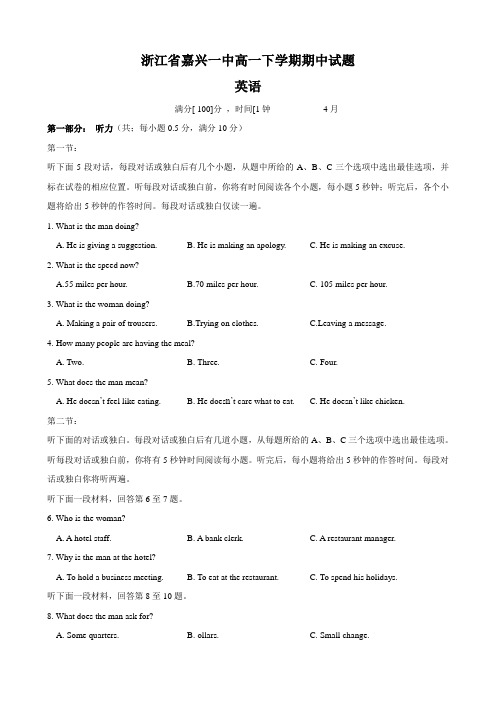
浙江省嘉兴一中高一下学期期中试题英语满分[ 100]分,时间[1钟4月第一部分:听力(共;每小题0.5分,满分10分)第一节:听下面5段对话,每段对话或独白后有几个小题,从题中所给的A、B、C三个选项中选出最佳选项,并标在试卷的相应位置。
听每段对话或独白前,你将有时间阅读各个小题,每小题5秒钟;听完后,各个小题将给出5秒钟的作答时间。
每段对话或独白仅读一遍。
1. What is the man doing?A. He is giving a suggestion.B. He is making an apology.C. He is making an excuse.2. What is the speed now?A.55 miles per hour.B.70 miles per hour.C. 105 miles per hour.3. What is the woman doing?A. Making a pair of trousers.B.Trying on clothes.C.Leaving a message.4. How many people are having the meal?A. Two.B. Three.C. Four.5. What does the man mean?A. He doesn’t feel like eating.B. He does n’t care what to eat.C. He doesn’t like chicken.第二节:听下面的对话或独白。
每段对话或独白后有几道小题,从每题所给的A、B、C三个选项中选出最佳选项。
听每段对话或独白前,你将有5秒钟时间阅读每小题。
听完后,每小题将给出5秒钟的作答时间。
每段对话或独白你将听两遍。
听下面一段材料,回答第6至7题。
6. Who is the woman?A. A hotel staff.B. A bank clerk.C. A restaurant manager.7. Why is the man at the hotel?A. To hold a business meeting.B. To eat at the restaurant.C. To spend his holidays.听下面一段材料,回答第8至10题。
浙江嘉兴市第一中学2016-2017学年高一英语10月月考试题
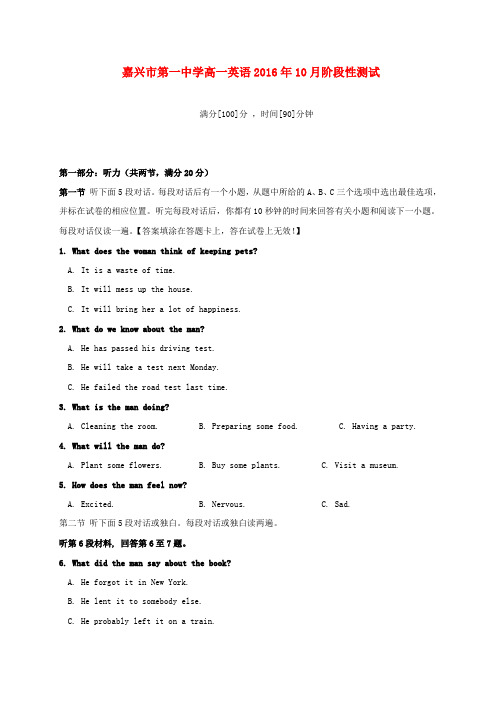
嘉兴市第一中学高一英语2016年10月阶段性测试满分[100]分,时间[90]分钟第一部分:听力(共两节,满分20分)第一节听下面5段对话。
每段对话后有一个小题,从题中所给的A、B、C三个选项中选出最佳选项,并标在试卷的相应位置。
听完每段对话后,你都有10秒钟的时间来回答有关小题和阅读下一小题。
每段对话仅读一遍。
【答案填涂在答题卡上,答在试卷上无效!】1. What does the woman think of keeping pets?A. It is a waste of time.B. It will mess up the house.C. It will bring her a lot of happiness.2. What do we know about the man?A. He has passed his driving test.B. He will take a test next Monday.C. He failed the road test last time.3. What is the man doing?A. Cleaning the room.B. Preparing some food.C. Having a party.4. What will the man do?A. Plant some flowers.B. Buy some plants.C. Visit a museum.5. How does the man feel now?A. Excited.B. Nervous.C. Sad.第二节听下面5段对话或独白。
每段对话或独白读两遍。
听第6段材料, 回答第6至7题。
6. What did the man say about the book?A. He forgot it in New York.B. He lent it to somebody else.C. He probably left it on a train.7. What did the man do in the past?A. He didn’t fix the woman’s bi ke.B. He damaged the woman’s bi ke.C. He crashed the woman’s car.听第7段材料, 回答第8至9题。
【月考试卷】浙江省嘉兴市2016-2017学年高一12月阶段性练习英语试题 Word版含答案
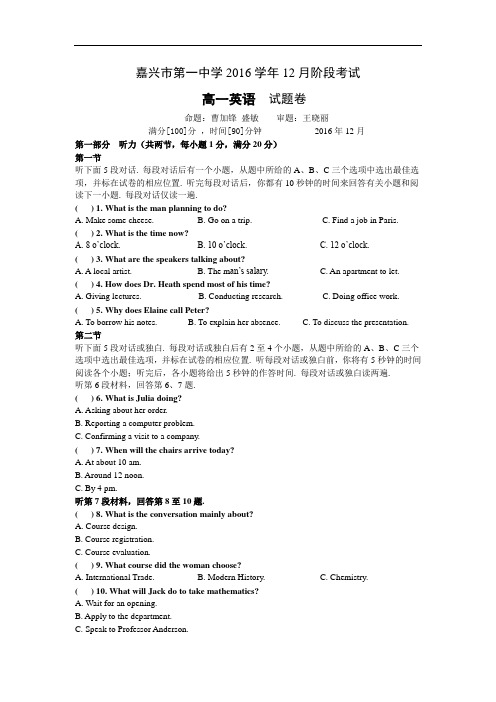
嘉兴市第一中学2016学年12月阶段考试高一英语试题卷命题:曹加锋盛敏审题:王晓丽满分[100]分,时间[90]分钟2016年12月第一部分听力(共两节,每小题1分,满分20分)第一节听下面5段对话. 每段对话后有一个小题,从题中所给的A、B、C三个选项中选出最佳选项,并标在试卷的相应位置. 听完每段对话后,你都有10秒钟的时间来回答有关小题和阅读下一小题. 每段对话仅读一遍.( ) 1. What is the man planning to do?A. Make some cheese.B. Go on a trip.C. Find a job in Paris. ( ) 2. What is the time now?A. 8 o’clock.B. 10 o’clock.C. 12 o’clock.( ) 3. What are the speakers talking about?A. A local artist.B. The m an’s salary.C. An apartment to let. ( ) 4. How does Dr. Heath spend most of his time?A. Giving lectures.B. Conducting research.C. Doing office work. ( ) 5. Why does Elaine call Peter?A. To borrow his notes.B. To explain her absence.C. To discuss the presentation.第二节听下面5段对话或独白. 每段对话或独白后有2至4个小题,从题中所给的A、B、C三个选项中选出最佳选项,并标在试卷的相应位置. 听每段对话或独白前,你将有5秒钟的时间阅读各个小题;听完后,各小题将给出5秒钟的作答时间. 每段对话或独白读两遍.听第6段材料,回答第6、7题.( ) 6. What is Julia doing?A. Asking about her order.B. Reporting a computer problem.C. Confirming a visit to a company.( ) 7. When will the chairs arrive today?A. At about 10 am.B. Around 12 noon.C. By 4 pm.听第7段材料,回答第8至10题.( ) 8. What is the conversation mainly about?A. Course design.B. Course registration.C. Course evaluation.( ) 9. What course did the woman choose?A. International Trade.B. Modern History.C. Chemistry.( ) 10. What will Jack do to take mathematics?A. Wait for an opening.B. Apply to the department.C. Speak to Professor Anderson.听第8段材料,回答第11至13题.( ) 11. Where does the conversation probably take place?A. In a shop.B. In a canteen.C. In an office.( ) 12. What bothers the woman?A. Her computer is down.B. Her paper is missing.C. Her hand is aching.( ) 13. When is the woman’s report due?A. Wednesday.B. Friday.C. Next Monday.听第9段材料,回答第14至17题.( ) 14. What is the man doing?A. Writing a book.B. Preparing a lecture.C. Searching for references.( ) 15. What does the woman suggest the man do?A. Make his topic more specific.B. Get a complete reading list.C. Read at least six books.( ) 16. What is the man going to focus on?A. Hollywood in the 1920s.B. 20th-century Hollywood movies.C. Golden Age Hollywood comedies.( ) 17. What is the relationship between the speakers?A. Student and teacher.B. Reader and librarian.C. Customer and shop assistant.听第10段材料,回答第18至20题.( ) 18. What will the weather be like in high places this evening?A. There’ll be showers.B. There’ll be heavy mist.C. There’ll be strong winds.( ) 19. How will the day start in coastal areas tomorrow?A. Cloudy.B. Rainy.C. Sunny.( ) 20. When can holiday makers expect good weather?A. This weekend.B. End of this month.C. Next month.第二部分阅读理解(共两节,满分30分)第一节(共10小题,每小题2分,满分20分)阅读下列短文,从每题所给的A,B,C,D四个选项中,选出最佳选项,并在答题卡上将该项涂黑。
2015-2016学年浙江省嘉兴市第一中学高二下学期期末考试英语试题(含听力)

嘉兴市第一中学2015学年第二学期期末考试高二英语试题卷命题:满分[ 150]分,时间[120]分钟2016年6月第一部分:听力(共两节,满分30分)第一节听下面5段对话。
每段对话后有一个小题,从题中所给的A、B、C三个选项中选出最佳选项,并标在试卷的相应位置。
听完每段对话后,你都有10秒钟的时间来回答有关小题和阅读下一小题。
每段对话仅读一遍。
1. What does the man probably want to do?A. Make a phone call.B. Have a meal.C. Enjoy the scenery.2. Where will the speakers go for their vacation?A. The mountains.B. The seaside.C. The city.3. When should the woman turn right?A. At the colored sign.B. At Joe’s Garage.C. After two miles.4. What does the woman want to know?A. What kind of typewriter it is.B. What price the man is asking.C. Why the man wants to sell the typewriter.5. How does the man feel about the news?A. Happy.B. Anxious.C. Unconcerned.第二节听下面5段对话或独白。
每段对话或独白后有2至4个小题,从题中所给的A、B、C 三个选项中选出最佳选项,并标在试卷的相应位置。
听每段对话或独白前,你将有5秒钟的时间阅读各个小题;听完后,各个小题将给出5秒钟的作答时间。
每段对话或独白读两遍。
听第6段材料,回答第6、7题。
金华、温州、台州三市部分学校2015-2016学年高一下学期第十次考试英语试题含答案(期中)
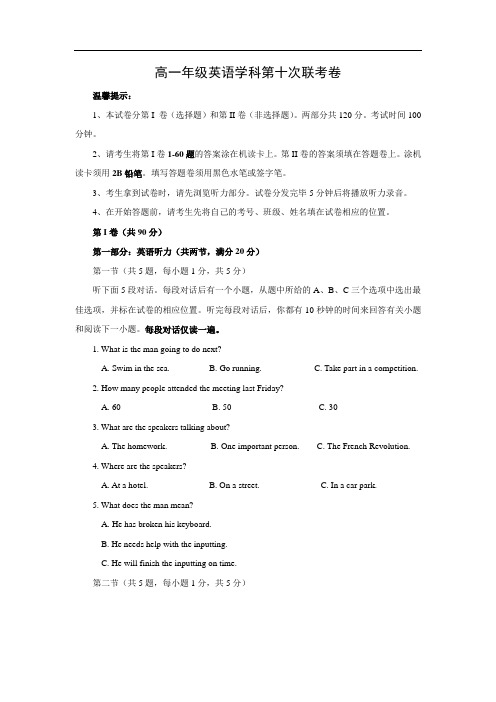
高一年级英语学科第十次联考卷温馨提示:1、本试卷分第I 卷(选择题)和第II卷(非选择题)。
两部分共120分。
考试时间100分钟。
2、请考生将第I卷1-60题的答案涂在机读卡上。
第II卷的答案须填在答题卷上。
涂机读卡须用2B铅笔。
填写答题卷须用黑色水笔或签字笔。
3、考生拿到试卷时,请先浏览听力部分。
试卷分发完毕5分钟后将播放听力录音。
4、在开始答题前,请考生先将自己的考号、班级、姓名填在试卷相应的位置。
第I卷(共90分)第一部分:英语听力(共两节,满分20分)第一节(共5题,每小题1分,共5分)听下面5段对话。
每段对话后有一个小题,从题中所给的A、B、C三个选项中选出最佳选项,并标在试卷的相应位置。
听完每段对话后,你都有10秒钟的时间来回答有关小题和阅读下一小题。
每段对话仅读一遍。
1. What is the man going to do next?A. Swim in the sea.B. Go running.C. Take part in a competition.2. How many people attended the meeting last Friday?A. 60B. 50C. 303. What are the speakers talking about?A. The homework.B. One important person.C. The French Revolution.4. Where are the speakers?A. At a hotel.B. On a street.C. In a car park.5. What does the man mean?A. He has broken his keyboard.B. He needs help with the inputting.C. He will finish the inputting on time.第二节(共5题,每小题1分,共5分)听下面5段对话或独白。
2018-2019学年浙江省嘉兴市第一中学、湖州中学高一下学期期中考试英语试题 Word版含解析 (1)
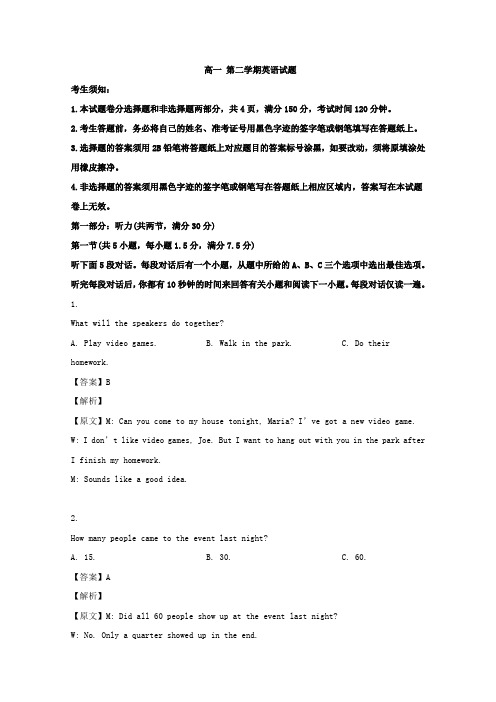
高一第二学期英语试题考生须知:1.本试题卷分选择题和非选择题两部分,共4页,满分150分,考试时间120分钟。
2.考生答题前,务必将自己的姓名、准考证号用黑色字迹的签字笔或钢笔填写在答题纸上。
3.选择题的答案须用2B铅笔将答题纸上对应题目的答案标号涂黑,如要改动,须将原填涂处用橡皮擦净。
4.非选择题的答案须用黑色字迹的签字笔或钢笔写在答题纸上相应区域内,答案写在本试题卷上无效。
第一部分:听力(共两节,满分30分)第一节(共5小题,每小题1.5分,满分7.5分)听下面5段对话。
每段对话后有一个小题,从题中所给的A、B、C三个选项中选出最佳选项。
听完每段对话后,你都有10秒钟的时间来回答有关小题和阅读下一小题。
每段对话仅读一遍。
1.What will the speakers do together?A. Play video games.B. Walk in the park.C. Do their homework.【答案】B【解析】【原文】M: Can you come to my house tonight, Maria? I’ve got a new video g ame. W: I don’t like video games, Joe. But I want to hang out with you in the park after I finish my homework.M: Sounds like a good idea.2.How many people came to the event last night?A. 15.B. 30.C. 60.【答案】A【解析】【原文】M: Did all 60 people show up at the event last night?W: No. Only a quarter showed up in the end.M: Hmm, I was expecting at least half of them would come.3.Why are the speakers going to the library?A. To find a partner.B. To meet Mr. Smith.C. To work on a project.【答案】C【解析】【原文】W: Do you want to join me for the science project? Mr. Smith said we need tochoose a partner and start working on it right away.M: Sure. Let’s meet at the library afterschool to work on it.4.Where does Linda probably live now?A. In a house near Nick’s.B. In a house on Main Street.C. In an old downtown apartment.【答案】A【解析】【原文】M: Hi, Linda! What are you doing in this neighborhood? Don’t you live on Main Street downtown?W: Hi, Nick! My husband and I just moved to a house two blocks from here!That’s a lot bigger than our old downtown apartment.5.How does the man feel about storms?A. He thinks they’re exciting.B. He dislikes them completely.C. He doesn’t like driving in them.【答案】C【解析】【原文】W: Did you see that lightning? A big storm is coming. I love storms. They’re so exciting!M: I don’t mind them, as long as I’m already inside my house! But I have to drive home from work later. I hope it doesn’t rain too hard when I’m on the road!第二节(共15小题,每小题1.5分,满分22.5分)听下面5段对话或独白。
浙江省嘉兴市一中2015-2016学年高一3月月考英语试卷

浙江省嘉兴市一中2015-2016学年高一3月月考英语试卷嘉兴市第一中学2016学年第二学期阶段性练习高一英语2016年3月满分100 分,时间90 分钟一、单项选择(本题共10小题;每小题1分,满分10分。
)从A、B、C、D四个选项中,选出可以填入空白处的最佳选项,并在机读卡上将该选项标号涂黑。
1. –When can we have dinner?--It ______ in the canteen.A. is being servedB. is servedC. servesD. is serving2 As he was born and brought up there, heshould be familiar ______ that area.A. toB. towardsC. withD.for3. The schools themselves admit that not allchildren will be successful in the jobs______ they are being trained.A.in that B.for that C.inwhich D.for which4. Is this factory _____ he worked before movingto Beijing?A. the oneB. whichC. whereD. in which5. Hearing the footsteps from the stairs, hehurriedly turned off the TV, picked up a book and pretended ______.A. readingB. to be readingC. toreading D. having read6. I had never imagined ______ such a bigaudience.A. there to beB. there beingC. therehad D. to have7. He decided to apply ______ the company______ the new position.A. to; toB. for; forC. to; forD. for; to8. His confidence ______ his good knowledge ofthe business.A. results inB. results fromC. asa result of D. results with9. The book ______ fifty maps or so, ______three of China.A. contains; includingB. includes;containingC. contains; containingD. includes;including10. We feel grateful to them for their efforts to______ pollution ______ our environmentbetter.A. prevent; makingB. protect; frommakingC. protect; to makeD. prevent; tomake二、完形填空(本题共20小题;每小题1.5分,满分30分)阅读下面短文,从短文后各题所给的四个选项(A、B、C、D)中,选出可以填入空白处的最佳选项,并在答题卡上将该项涂黑。
- 1、下载文档前请自行甄别文档内容的完整性,平台不提供额外的编辑、内容补充、找答案等附加服务。
- 2、"仅部分预览"的文档,不可在线预览部分如存在完整性等问题,可反馈申请退款(可完整预览的文档不适用该条件!)。
- 3、如文档侵犯您的权益,请联系客服反馈,我们会尽快为您处理(人工客服工作时间:9:00-18:30)。
嘉兴市第一中学2015学年第二学期期中考试高一英语命题:郁晓丽杨跃典2016年4月第一部分:听力(共20小题;每小题0.5分,满分10分)第一节听下面5段对话。
每段对话后有一个小题,从题中所给的A、B、C三个选项中选出最佳选项,并标在试卷的相应位置。
听完每段对话后,你都有10秒钟的时间来回答有关小题和阅读下一小题。
每段对话仅读一遍。
1. How long will the speakers stay in Greenwich?A. Two hours.B. Two and a half hours.C. Three and a half hours.2. What does the man want the woman to do?A. Return some books.B. Talk with a professor.C. Cancel classes.3. Where are the speakers?A. In a restaurant.B. At home.C. On a ship.4. To whom is the woman speaking?A. A seller.B. A builder.C. A guide.5. What does the girl think of math lessons?A. They’re not so popular.B. They’re not very challenging.C. They’re not simp le enough for her.第二节听下面5段对话或独白。
每段对话或独白后有几个小题,从题中所给的A、B、C三个选项中选出最佳选项,并标在试卷的相应位置。
听每段对话或独白前,你将有时间阅读各个小题,每小题5秒钟;听完后,各小题给出5秒钟的作答时间。
每段对话或独白读两遍。
听第6段材料,回答第6、7题。
6. What is the relationship between the speakers?A. Employer and employee.B. Husband and wife.C. Colleagues.7. What will the man do next?A. Clear dirty dishes.B. Change tablecloths.C. Fold the paper.听第7段材料,回答第8、9题。
8. How does the man overcome his fear?A. By walking.B. By shouting.C. By singing.9. What did the woman do on the stormy night?A. She injured her head.B. She hid somewhere.C. She jumped on the bed.听第8段材料,回答第10至12题。
10. Why does the girl care about the show time?A. She needs time to do her homework.B. She and Shannon have fixed the time.C. She doesn’t want to come home early.11. Which show will the girl see?A. The nine o’clock show.B. The seven fifteen show.C. The five o’clock show.12. How will the girl go to the cinema?A. By car.B. By bus.C. By bike.听第9段材料,回答第13至16题。
13. What is the most common reason to refuse an artist’s work?A. The style is not popular.B. The subject matter is unsuitable.C. The quality is not high enough.14. What does Rachel find difficult to explain to artists?A. Their work doesn’t se ll.B. Their work is not accepted.C. They don’t receive payments.15. What does the guidebook contain?A. An introduction to the artist.B. Advertisements for exhibitions.C. Good reviews of pictures.16. What does Rachel find most enjoyable about her job?A. Not knowing what to expect.B. Being close to art.C. Meeting nice people.听第10段材料,回答第17至20题。
17. At what time will the listeners begin to have their lunch break?A. 11: 40.B. 11:50.C. 12:00.18. What is the speaker mainly talking about?A. A new product.B. A recycling system.C. An art program.19. When will the changes take place?A. Next Wednesday.B. Next Thursday.C. Next Friday.20. What are the listeners asked to do?A. Visit the speaker’s office.B. Select food to order.C. Pick up a piece of paper.第二部分:阅读理解(共两节,满分37分)第一节(共16个小题;每小题2分,满分32分)阅读下列短文,从每题所给的四个选项(A、B、C和D)中,选出最佳选项,并在答题卡上将该项涂黑。
AI arrived late one night on a business trip, so I decided to have dinner in the hotel I stayed in. As I was finishing my meal, an elderly couple came in. They were holding hands and had lovely smiles on their faces. They sat three tables from me. I was amazed at the love they showed for each other. It stuck me because it was shortly after ending a 20-year marriage and I still had pain in my heart.My waiter was also their waiter. As I paid my bill, I asked what their bill was. He told me, and I gave him $40 to pay their bill. He asked if I knew them and I told him “No, I just wanted to repay them for the love that they were showing to each other,” and then I left.The next day I entered the restaurant again. After I had been seated, the waiter who served me the night before told me that the strangest thing happened after I left the restaurant. When the elderly couple went to pay for their meal, they were told that it had been paid. The waiter just told them what I said. They were amazed. They looked around, asked for the bill of two young couples who were seated together, paid their bill and left.I smiled and ordered my meal. About 45 minutes later, I finished my meal and was about to head out, but my waiter was nowhere to be found. I explained to the hostess that I needed to pay for my meal and hurry to the airport. She smiled and explained that I would not have to pay, because she felt she should pay for my bill because of the joy brought to the faces of the elderly couple and the amazement of the young couples.When I told her that they didn’t have to do that, she said with a smile “Love creates Love.”21. From the first paragraph we know the writer must feel __________.A. pleasedB. worriedC. sadD. nervous22. The elderly couple paid the bill of the two young couples because they __________.A. knew the two young couplesB. were happy to pass the love they gotC. were always ready to help poor peopleD. wanted to invite the young people to the meal23. The writer’s purpose of writing the passage is to __________.A. suggest true love never diesB. share an interesting experienceC. encourage us to help people in needD. prove a show of love really makes a differenceBIt’s long been known that dogs and cats, with their well developed sense of smell, can be trained to identify the chemicals released by human illnesses. In some cases, researchers have even trained household pets to detect or predict epilepsy(癫痫病). But what if we could put the sense into a microchip(芯片), allowing us to create a breathalyzer(呼吸分析器) for diseases?For Dr. Andrew Koehl, the inventor of the microchip technology at the heart of this digital nose, the technology that will allow us to do just that is already here. “We can detect down to parts per billion levels,” Koehl says. “To give you a similarity that’s equal to one drop in an Olympic size swimming pool.” The sensor(感应器) identifies each chemical’s make-up in the air. If the sensor is set to a certain level, it will set off an alarm.Work continues to make it smaller and makes it able to enter the healthcare market. Within several years, the company hopes to develop it as a diagnostic(诊断) tool. “What’s amazing is that there really are chemicals on your breath that indicate illness. That’s been shown through a number of studies and we can detect those,” he said. “There have already been a number of research papers published s uggesting we can detect many disease.”At the beginning, the technology had been developed for defense purposes. He said the terror caused by the events of September 11 had got him thinking about the application of this type of sensor in safety check. “Ori ginally it was aimed at detecting things like explosives, poisonous chemicals and other terrors that might occur,” said Dr Koehl.Eventually the sensor could become a part of many everyday instruments, warning users of which foods are going bad in the fridge or even the best moment to take the roast out of the microwave oven.You could even, one day, have a digital nose that you could carry in your pocket. “More recently we’ve been looking at user spaces so we’re talking to a number of producers of mobile p hones and mobile phone parts,” he said. “We want to develop a module small enough to put into mobile devices(装置) like phones.”24. It can be inferred from the passage that_______.A. This type of sensor was designed to prevent disease at firstB. The digital nose can be put into mobile phones at presentC. Users might take the mobile devices with them in near futureD. The new invention has already entered the healthcare market25. The underlined word “ detect”(Paragraph1)is closest in meaning to_______.A. protectB. discoverC. settleD. remove26. What does the passage mainly want to tell readers?A. Dogs and cats have a strong sense of smell.B. A new sensor is used to identify chemicals.C. Modern technology is developing very fast.D. Digital noses on a microchip can smell diseases.COne day, Mr. Arnold was teaching a lesson, and things were going as normally as ever. He was explaining the story of human being to his pupils. He told them that, in the beginning, men were nomads (游牧); they never stayed in the same place for very long. Instead, they would travel about, here and there, in search of food, wherever it was to be found. And when the food ran out, they would move off somewhere else.He taught them about the invention of farming and keeping animals. This was an important discovery, because by learning to cultivate (耕作) the land, and care for animals, mankind would always have food steadily. It also meant that people could remain living in one place, and this made it easier to set about tasks that would take a long while to finish, like building towns, cities, and all that were in them. All the children were listening attracted by this story, until Lucy jumpedup:“And if that was so important and improved everything so much, why are we nomads all over again, Mr. Arnold?”Mr. Arnold didn’t know what to say. Lucy was a very clever girl. He knew that she lived with her parents in a house, so she must know that her family were not nomads; so what did she mean?“We have all become nomads again,” continued Lucy, “The other day, outside the city, they were cutting the forest down. A while ago a fisherman told me how they fish. It’s the same with everyone: when there’s no more forest left the foresters go elsewhere, and when the fish run out the fishermen move on. That’s what the nomads did, isn’t it?The teacher nodded, thoughtfully. Really, Lucy was right. Mankind had turned into nomads. Instead of looking after the land in a way that we could be sure it would keep supplying our needs, we kept developing it until the land was bare. And then off we would go to the next place! The class spent the rest of the afternoon talking about what they could do to show how to be more civilized (文明的).The next day everyone attended class wearing a green T-shirt, with a message that said “I am not a nomad!”And, from then on, they set about showing that indeed they were not. Every time they knew they needed something, they made sure that they would get it using care and control. If they needed wood or paper, they would make sure that they got the recycled kind. They ordered their fish from fish farms, making sure that the fish they received were not too young and too small. They only used animals that were well cared for, and brought up on farms.And so, from their little town, those children managed to give up being nomads again, just as prehistoric men had done, so many thousands of years ago.27. Why would early humans travel about in the beginning?A. To experience different lifestyles.B. To go sightseeing in different places.C. To find what they could to feed themselves.D. To do more exercise to build themselves up.28. From Paragraph 2, we can know that _______________.A. people got tired of living in the same placeB. people gradually got used to living in citiesC. people spent a long time in learning to keep animalsD. people tended to settle down after learning farming and keeping animals29. The teacher thought Lucy’s argument was ______A. reasonableB. unbelievableC. puzzlingD. shocking30. Which of the following agrees with the message “I am not a nomad” (Paragraph 7)?A. People eat young fish for its delicious taste.B. People use recycled materials as much as possible.C. Fishermen move elsewhere when there is no fish left.D. Foresters leave the place where there is no wood left.31. The writer tries to make us believe that ______.A. mankind has been progressing mainly through traveling aboutB. it’s unwise for mankind to use the land in an uncontrolled wayC. it’s quite good for students to learn more about the history of mankindD. teachers should encourage students to voice their own opinions bravelyDEarlier this month, blogger Lisa Henderson announced that she and her husband John had decided not to have Christmas. The family, who lives in Utah, will still put up decorations, but presents from Santa are a no-go this year.“John and I feel like we are fighting a very hard uphill battle with our kids when it comes to their rights,” Henderson wrote on her blog. “It is one of the biggest struggles as a parent these days in middle class America. Our kids have been acting so ungrateful lately. ... John said, “We shouldn’t just celebrate Christmas. And, so that’s what we did.”Instead, the Hendersons are putting the money they would have spent on gifts toward service projects in order to teach their three sons the “pleasure of giving.” The children will still receive gifts from grandparents and other family members, but this year, she said, their letters to Santa will be asking him to find someone who needs presents more than they do.In an interview with ABC News, 11-year-old Caleb Henderson admitted that he and his brothers had been behaving badly. “We would hit each other. We were fighting and crying,” headmitted, and Lisa said that when she broke the news to her sons, they cried pretty hard.But so far, Henderson told Fox News last week, the family is having a sudden turning this into a different kind of gift. They have already held a clothing drive and sent boxes of clothes and candy to a village in the Philippines that was hit hard last year by Typhoon Haiyan.“The children were excited and kept wanting to give more and more,” she reported on her blog.Many readers responded positively to Henderson’s post. Some sharing their own stories of limiting Christmas in order to teach their children to be charitable(仁慈的) or grateful. “As parents you’re giving your kids something so much more special than a bunch of gifts on Christmas,” one wrote.But Henderson received negative follow-ups as well on her blog. Responding to critics, she updated her blog with a statement that reads, in part:I just wanted to explain a couple of things. First, my kids are in no way hurt for things.... They have reacted by making gifts for each other and packing them into each other’s stockings stealthily(偷偷地). They are learning exactly what we wanted them to learn, because they are not moving around feeling sorry for themselves. They are thinking of others.The second thing I wanted to explain is why I wrote this post. Some people seem to think I wrote this for attention. Ummm, the attention you get from posts like this is not good and actually extremely difficult to deal with.... The reason I wrote this post is I want to empower parents to feel like it’s okay to take a stand. ... I wanted to share what we are doing, so any parents that feel they are struggling with the same issues in their home can see what others are doing and get ideas for their family. My intention is to help support other parents and to raise amazing kids.32. The Hendersons decided not to spend Christmas because_______.A. their kids could receive presents from their other family membersB. the struggling couple tried to save some money to buy kids giftsC. they wanted to make their kids understand the pleasure of givingD. the whole family would go to the disaster areas in the Philippines33. After joining their parents in doing volunteer services, the Hendersons’ kids became_______.A. selfish and stubbornB. determined and devotedC. hopeful and honestD. grateful and generous34. The underlined sentence in Paragraph 4 can be replaced by_______.A. all the kids let out an excited cry when Santa sent them Christmas presentsB. when Lisa told the kids they didn’t spend Christmas, they felt extremely sadC. the moment Lisa said the Philippines was hit by typhoon, they burst into tearsD. when their grandparents didn’t send them gifts, the kids couldn’t help crying .35. From the last two paragraphs we can conclude that_______.A. the writer wants to share his experiences of raising amazing kidsB. educating kids needs regular communication and great patienceC. the writer strongly called on people to care for the unfortunateD. parents should praise children for their kindness to other people36. Which of the following can be the best title?A. Why These Parents Decided Not To Celebrate Christmas.B. How Americans Spend A Traditional Christmas Nowadays.C. A Hard Battle between Kids And Parents At Christmas.D. What American People Do To Have A Nice Christmas.第二节(共5个小题;每小题1分,满分5分)根据短文内容,从短文后的选项中选出能填入空白处的最佳选项。
